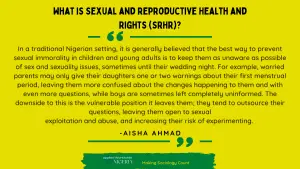Friendship is a very vital component of human engagements. It’s a relationship that is a few degrees lesser than blood and marriage in terms of significance. Much literature has been written on the significance of friendship and the absence of it has a remarkable effect on the mental and psychological well-being of people. In this article, we will look at the effect of female friendships on marriages, especially in the northern part of Nigeria.
Right from a young age, human beings scout for friendship from all available sources. Some of these friendships endure for a lifetime while others are short-lived due to a range of reasons.
Of particular importance is the role friends play before, during, and after wedding ceremonies. From the concept of bride’s maids to groom’s men, the importance of friends shines very bright. In fact, some marriages are arranged and nurtured through the help of friends.

However, despite the significance of friendship in the lives of people, marriages tend to have a noticeable impact on it, especially among females in northern Nigeria.
To understand the dynamics of friendships in Northern Nigeria, this essay will assess it based on the following factors:
- Prospects of Polygamy
- Wedding Participation Pressure
- Cultural Perceptions of Friends
- Relocation After Marriage
- Birth and Changing Dynamics.
- A World of New In-Laws
Prospects of Polygamy
Being a region that is dominated by Muslims and Islamic values, life in northern Nigeria has many examples of polygamous homes. And the possibility of it happening to any bride is always accounted for in social discourses. Polygamy is not a thing many women are comfortable with.
This prospect of a husband developing interest in his wife’s friend, although uncommon, is not left by many wives to chance. There have been many stories in which a woman’s friend connived to get married to her friend’s husband as a second wife. This makes many women always be on alert and have their guard up against the possibility of such encroachments.
This scenario is never fully discussed because it will create a rift between friends. But it is done through cold wars and subtle innuendos that pass a message to any female friend who may be interested in crossing the line.
Hence, it is not common to see a wife trusting her husband to spend unmonitored time with her friends or even offer them extended courtesy. Every form of relationship between the husband and her friends is closely monitored and assessed.
These overprotectiveness and cold innuendos combine to reduce the fluency with which female friends relate after marriage.
Wedding Participation Pressure
Weddings are times of elaborate celebration and merriment. And there are no better people to spend such moments with than family, loved ones, and friends. This is a time when friends purchase Aso-ebi to adorn themselves during weddings. They also contribute money to buy meaningful and expensive gifts for their friends getting married.
Serving as a bride’s maid is a huge honor to many friends and a symbol of the strength of friendship that exists between the bride and her friends. At the same time, it is a very capital-intensive endeavor.
Some friends, especially those who have little financial means often end up feeling overwhelmed by these responsibilities. Those who can not afford to pay but can not confidently come out to tell the bride about their situation often end up ghosting the wedding. A situation that causes disappointment and sadness to the bride. Every bride wants to be surrounded by as many friends as possible on her special day and any absentee is easily noticed and marked.
Also, due to the strict nature of parenting in northern Nigeria, many parents do not allow their daughters to be out all night in service to their friend as a bride’s maid. Or worse when the bride is to be conveyed to another state as her matrimonial home. Many parents do not give their daughters the green light for such travels. This serves as another source of disappointment for brides.
These things combine to form a very lasting image in the minds of the bride and this disappointment often spills over to after the wedding. Eventually leading to rift and tension in her friendship with friends who didn’t show up in one way or the other.
Cultural Perception of Friends
There is a cultural perception of female friends in northern Nigeria as the number one spoiler of marriages. It is often told to brides during their pre-wedding sermons by aunts to be wary of their female friends. It is so believed by these aunts that female friends give bad or ill advice to their friends that many times leads to the dissolution of such marriages.
This prejudice is often inspired by the disdain society has for women who are of marriageable age but remain unmarried. The advice is targeted at female friends who are unmarried. Society believes an unmarried female friend has more motive to give her friend bad advice than she does to give her good advice that will help her married life. The general consensus is that such unmarried friends will be glad to see their friend get divorced and rejoin them in the ‘streets’
Based on these preconceptions, and cultural stereotypes, the friendship of females after marriage hit bumpy roads. Some brides seize every chance they get to remind their friends of the difference in their marital status and prestige in society.
Relocation After Marriage
Many brides change locations after marriage. They mostly move from their fathers’ houses to their husbands’ houses. Which in some cases are located in different states altogether. This relocation marks an end to the friendship that exists between a bride and her neighborhood or city friends. Communication has to be done through phone calls or social media. And as it has been observed severally, distance has a way of dampening relationships between friends and lovers. This is why many people are not fond of long-distance relationships in the first place.
Relocating to a new place exposes the bride to a new cultural world and lifestyle. In some cases, the bride moves to a city with a different language and time zone from her indigenous home. This cultural shock requires some time to be adapted to and while this is going on, some friendships suffer decline.
Birth and Changing Dynamics
The single most life-changing event in any woman’s life is birth. From the moment a woman becomes a mother and her priorities get shifted to caring for her newborn, everyone and everything else becomes secondary. Motherhood is not a flowery bed of roses or an easy journey. This is especially true regardless of how many times a woman has given birth, the responsibility and demand of it is never on the decline.
This is especially more pronounced in the lives of brides who are first-time mothers and usually give birth in the first year of marriage. This comes at a time when the friendship between a bride and her friends has not been fully resolved after a change in status and then comes another rise in status to the station of motherhood.
While some friends may understand the reasons why their married friend is not very available now, others who have not experienced such changes in their lives may struggle to understand and cope. This is also compounded by the cultural practices imposed upon the new bride such as ‘Wankan Jego’
A New World of In-Laws
Getting married means becoming a member of a whole new family by law. In northern Nigeria, the in-laws have a strong and significant impact on the lives of couples, especially during the first few years when the integration takes place.
While couples, especially the brides, are learning the ropes of diplomacy and getting settled into the new life of a larger family, the friendship with her female friends may suffer some downtime in terms of attention and participation.
Getting settled into a new life can be overwhelming. While friends are capable of offering succor and ease in our times of adjustment, transitioning into their new families is something many brides choose to do alone. And on their own terms with minimal influence from friends.
Recommendations
- While polygamy is an acceptable practice in northern Nigeria, couples need to have an honest conversation about it. Especially regarding their female friends. If the possibility of it tampers female friendships after marriage, by discussing it, couples can find a way of meandering through the problem instead of passing innuendos.
- Friends need to have honest conversations about what they can or not do to their female friends before, during, and after their wedding. If a friendship is real, then friends of all people should understand the capacities and capabilities of each other.
- The prejudiced perception of unmarried friends by society needs to be toned down. While marriage is a good thing, it may not be everyone that is destined to do it. It is also a personal decision. Therefore, the cultural belief that unmarried friends are a bad influence can be changed from a mindset level.
- Thanks to technology, the distance between friends after marriage can be bridged. Friends however need to be willing to put in the effort for their friendship to keep blooming.
- The stress that comes with birth and motherhood needs to be understood by both parties. The benefit of the doubt has to be given where necessary and an effort made to provide human support.
- The transition into a new family is as successful as the In-laws make it to be. Having a smooth integration eases things for a bride and by extension her friendship.
Conclusion
It has been seen how important friendship is to humans and in the same breadth how social contracts such as marriage can shape it. Humans can not do without friendship and it is therefore why attempts have to be continually made in order to address the factors that shape it so that we can have a healthier and more socially vibrant society.





